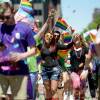Updated at 8:15 a.m. June 11
Hundreds of people gathered on Boston Common on Friday evening for the 25th Boston Dyke March.
Originating in Washington, D.C., in 1993, the Dyke March has been held for over two decades in cities around the country as a "fundamentally grassroots" alternative to Pride celebrations that have become increasingly commercialized.
The march has been held in Boston since 1995, but this was its first year back in full force since 2019 because of the pandemic. People of all ages gathered to celebrate Pride, seek connection and raise awareness of challenges facing the LGBTQ community. Participants at the march did not seem to mourn the absence of Boston's official Pride Parade after the dissolution of the city's Pride organization.
"I think the really nice thing about the Dyke March is that it is something that is grounded in what Pride has traditionally stood for," said Harper Ferraro, 30, of Boston. "I think that sometimes certain Pride celebrations can become very much like a party, which is lovely and fun, but it's always good to be reminded of why we started having this tradition in the first place."

Ferraro added that with recent legal and federal challenges to LGBTQ rights — most notably for transgender people — events like the Dyke March can help marginalized groups connect with each other. The Boston Dyke March brands itself as an intersectional event that welcomes people of all sexualities, races, physical abilities and genders.
"It's a bunch of different people who all come from different walks of life and are different racial groups and gender identities and things like that coming together to show how much we support each other, and how strong we can be when we're together," they said.
Many members of the local nonbinary community came to Friday's event, including 18-year-old Kai Doran, a student at Northeastern University who brought the nonbinary pride flag to display while at the march.
"I dealt with a lot of bullying in high school, and to come out here today and to see people use the word 'dyke' and reclaim it ... that felt really powerful and freeing to me," they said. "It's Pride Month — it's time to celebrate who we are."

The event also featured performers, musicians and vendors from local LGBTQ-owned buisnesses and nonprofit organizations.
Chastity Bowick, 36, is the executive director of the Transgender Emergency Fund of Massachusetts,which helps secure housing, medication, and other resources to trans people in Massachusetts. She said the organization decided to set up a table at the Dyke March to raise awareness about issues within the local transgender community.
"This is the place where a lot of people find their voice. We have a lot of younger folks here who will potentially, hopefully in the future, become activists for the LGBTQ+ community," she said. "We're fighting for inclusion. We're fighting for support ... and if [lawmakers] don't want to give us these spaces, we create them ourselves."

A majority of demonstrators were students from local high schools and universities, including some who were attending the a Pride event for the first time.
"A march, especially like this, will make visible a lot of queer resources that some people really need," said Rihanna Perry, 16, of Haverhill. "Like these are all the queer people in Boston and there are so many more who didn't come to the parade — it's just nice to [see]."
"If I'd seen more [gay] representation when I was a kid, maybe I would have figured [out my identity] a couple decades earlier."-SUSAN SPILECKI, 54, OF BOSTON
That visibility was also one of the draws for Susan Spilecki, 54, of Boston. She said one of the reasons she attended the Dyke March is because she would have liked to see more LGBTQ role models during her formative years.
"I didn't know about any of this growing up. I came out at 47 after a lot of years of not thinking I knew anybody who was gay," she said. "If I'd seen more representation when I was a kid, maybe I would have figured it out a couple decades earlier."
This story was updated to correct the spelling of Harper Ferraro's last name and their pronouns.







